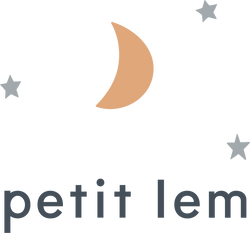Baby talk and all that jazz
Did you know that a baby’s brain reaches over half of its adult size in the first three months of life? We don’t mean to alarm you, but yes, what happens in the first year is critical for your child’s future success. The good news: research shows that you, in fact, will have the most dramatic influence over your baby’s brain growth and future learning ability—by doing some of the simplest things.
Let them see the world through your eyes
To stimulate your baby from the very beginning, provide situations where they can observe and explore. Use your baby carrier as often as possible, and walk around the house, go for a walk outdoors or simply run your errands with your favourite plus one—and talk them through it all. Describe everything you see and interact with the people around you. Not only are you stimulating their senses with all the sights and sounds, you’re introducing them to language and you’re giving them a real sense of the world, as you see it. Bonus tip: The grocery store, with all the colourful fruits and vegetables and generally good-natured people is a great place to start, as is the park.
That famous tummy time
The benefits of tummy time for babies cannot be overemphasized. Spending time on their belly is important for building upper body strength, especially since infants will generally spend the majority of their time on their back, whether during naps, or on their seats and swings. It basically single-handedly prepares your baby for crawling, rolling over and eventually sitting up on their own. Prepare for some fuss, though, most babies don’t initially enjoy it. Start slowly, with 30 second to a minute-sessions, and work your way up to 5 minutes as your baby grows. And make it part of your daily routine, scheduling it after every nap, for example.
Play music and dance to the rhythm
As soon as our little ones start wailing or refuse to nap, our first instinct is to sing a lullaby. Music has long been known to be as therapeutic as it is soothing. Not only does music have the ability to calm the nervous system, it also helps with hearing development and sound recognition. Try playing some of your favourite songs and hold your baby while you sway or bounce to the rhythm of the music. This will strengthen the bond between you and encourage strong emotional development. Moreover, listening to the lyrics will help develop language skills.
Make eye contact often
When you’re talking to your baby, make sure you are looking them straight in the eyes. Babies as early as 2 weeks old are said to recognize their mother’s face. Make funny faces, smile a lot and watch for your baby’s reactions. Eventually, they might even start imitating you. This is their first introduction to back-and-forth conversation and communication.
Get active
If the gym has taught us one thing, it’s that a muscle strengthens when you use it over and over again—consistency is key! Same goes with babies. As your baby grows, you’ll want to encourage him to pull himself up, stand and crawl. Call him from across the room to give him that extra motivation to move, or place some of his favourite objects on top of a table or a couch to incite him to stand.
Let them explore
Babies always set their sights on the kitchen cabinets when they’re ready to explore the home. All those pots and pans and the sounds they make when they collide are as fascinating as they are fun—and they help establish cause and effect. Take out some Tupperware and let them fill it with safe objects (nothing that might present a choking hazard). And invest in some shape sorters and stacking blocks to incorporate early problem-solving skills that will boost your baby’s brain power and bolster their development.
Remember, your baby is going to grow at their own pace, so most importantly, don’t get frustrated or impatient if they’re not meeting developmental goals. Just focus on providing a safe and stimulating environment and have fun! After all, the most crucial thing you can do in that first year is to show your baby how much you love them.








